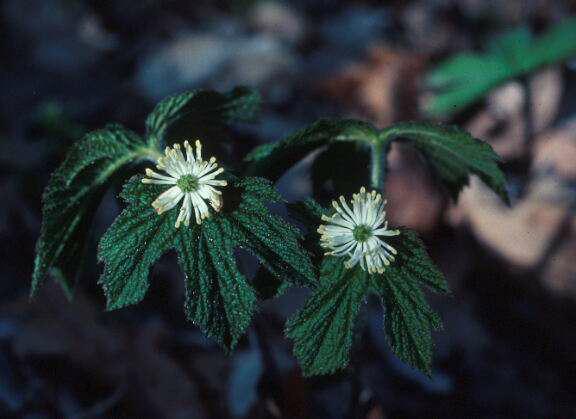Golden seal (Hydrastis canadensis)
Golden seal
Hydrastis canadensis, commonly called golden seal, is a native Missouri wildflower which occurs in rich woods, wooded slopes and valleys, and typically grows 10-15″ tall. Features a single, large, palmately lobed, wrinkled, basal leaf (to 8″ wide) and a two-leafed flower stalk topped with a solitary, yellowish green to greenish white, apetalous flower with prominent whitish stamens. Flowers bloom in spring, and give way to attractive but inedible scarlet red berries. Hydrastine is a bitter alkaloid which is extracted from the rootstock for certain pharmacological purposes (aids digestion or inhibits bleeding). Rootstock was used by early Americans for a variety of purposes including tonic, diuretic, insect repellent and yellow dye. All parts of the plant are poisonous in large doses, however.
Genus name comes from the Greek word hydor meaning water.
Specific epithet means of Canada.
Common name is in reference to the plant’s thick, yellow rhizome.

Easily grown in average, medium, well-drained soil in part shade. Prefers well-composted soils with lots of leaf mold.
| Hardiness zone | 3 - 8 |
| Sun light | Part shade |
| Water | Medium |
| Maintenance | Low |
No serious insect or disease problems.
Woodland garden, native plant garden, shaded naturalized plantings or wild garden.
| Common name | Golden seal |
| Botanical name | Hydrastis canadensis |
| Plant type | Herbaceous perennial |
| Family | Ranunculaceae |
| Hardiness zone | 3 - 8 |
| Water | Medium |
| Maintenance | Low |
| Flower color | Greenish-yellow to greenish-white |
| Flowering period | April - May |
| Height | 0.75 to 1 ft. |
| Width | 0.75 to 1 ft. |